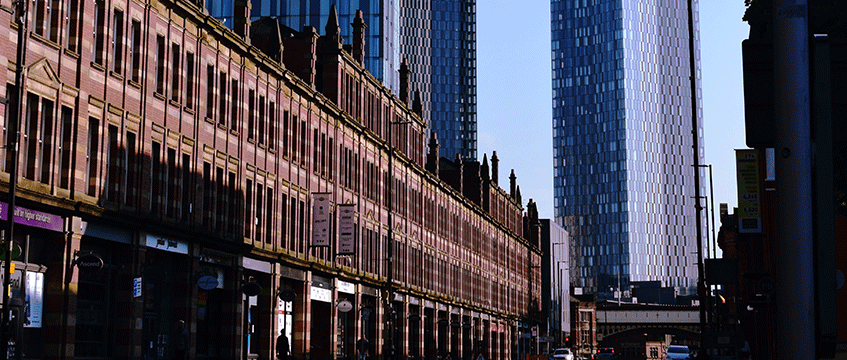LISTEN A place of “ambition and progressive thinking” is how Sheona Southern, managing director of Marketing Manchester, describes her city. She points to “trailblazers and changemakers” including Alan Turing, LS Lowry and Emmeline Pankhurst. Now she’s thinking about how the city – which her agency promotes nationally and internationally – can position itself for its next phase of growth.
In a podcast recorded at the UKREiiF conference in Leeds, Southern discussed the factors and influences shaping Manchester’s pitch to investors – and the role real estate has to play in that.
“In terms of the continued development over the past three years with Covid, 95% of our planning developments went ahead,” she says.
“We have still got the most cranes on the city skyline in terms of the development we are putting forward. It’s based on sector strengths and public and private partnership coming together to deliver a really strong plan, whether it be in the local authorities or right across the combined authority with the mayoral leadership.”
Digital dreams
The sectors driving the city and wider regions are changing, Southern says.
“When I took over this job seven years ago, Concretene hadn’t been invented,” she says. “Advanced manufacturing is really driving innovation. Digital has changed hugely and we have welcomed several sector leaders. We have e-commerce, which is right across Manchester’s landscape because of our heritage – we have huge dot-com businesses that are in our infrastructure now. And, of course, on the financial and professional side, we are the biggest [location] outside of London.”
Does a shift in the sectors driving the city’s success mean the locations with which it competes on the national and international stage also change?
“Of course,” Southern says, “and nowhere more than digital. On the digital side what we try and do is benchmark against other cities across the world that are doing a good job.
We have always looked to perhaps the United States in terms of the digital infrastructure, but I think we are embedding that through our fibre network across Greater Manchester in terms of trying to keep up with that, those factors that are necessary for investors and businesses to be attracted to the region.”
Arts and culture play a crucial part in the city vision, Southern adds. “Culture, sports, music is a key part of any global city and it’s an underpinning asset,” she says. “We are seeing a step change in culture because the city does invest in cultural infrastructure and there’s a unique opportunity in the next two years as we’ll see key new assets opening.”
That includes the Factory International, set to open in July, which will become a permanent home of the Manchester International Festival. “Think about the Shed in New York,” Southern says by way of comparison. “It’s something of that status – a fantastic architectural building right in the heart of the city.”
Then there will be a second arena, a 23,000-seat indoor stadium. “Music in the next two years will be a significant step change in our cultural offer that really underpins and adds to an attractiveness for investors, people who want to come and do business in the region,” Southern says.
Changing skyline
Such schemes mean real estate has an important role to play in Manchester’s future, Southern adds.
“Five years ago if you walked around Manchester Central and our council buildings, there wouldn’t have been trams there, there wouldn’t have been magnificent new buildings and a tree-lined avenue,” she says. “It was quite a different area. It is a now a home for financial and professional businesses to set up right in the heart of the city.
“And with our high-rise, the skyline now has half a dozen more large buildings, which then changes the dynamic in the skyline of the city. So we have city living now not only in apartments, but some lovely family homes around our new neighbourhoods.”
And she is quick to note that private sector developers keen to tap into the city’s growth will be welcomed with open arms.
“That’s something that Manchester really prides itself on in terms of partnership – the pioneering nature, the can-do, the doing things differently,” Southern says. “We do come together. We are a big city, but we have flexibility to work together.
“I think that’s why we get things done in a more adaptable, quicker way, working in that partnership that has really been at the forefront and the backbone of the success of Manchester over the past three decades.”
To send feedback, e-mail tim.burke@eg.co.uk or tweet @_tim_burke or @EGPropertyNews
In partnership with












